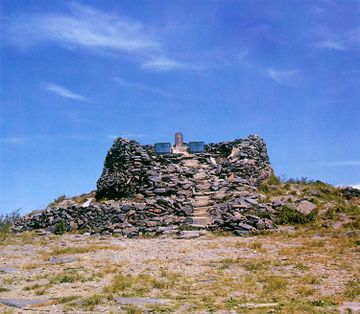태백산 천제단
| 태백산 천제단 Cheonjedan Altars on Taebaeksan Mountain |
|
 "태백산 천제단", 국가문화유산포털, 문화재청. |
|
| 대표명칭 | 태백산 천제단 |
|---|---|
| 영문명칭 | Cheonjedan Altars on Taebaeksan Mountain |
| 한자 | 太白山 天祭壇 |
| 주소 | 강원도 태백시 태백산로 4834-31, 혈동 산87-2 (소도동) |
| 지정(등록) 종목 | 국가민속문화재 제228호 |
| 지정(등록)일 | 1991년 10월 23일 |
| 분류 | 유적건조물/종교신앙/제사유적/제사터 |
| 시대 | 시대미상 |
| 수량/면적 | 3기 |
| 웹사이트 | "태백산 천제단", 국가문화유산포털, 문화재청. |
|
|
|
목차
해설문
국문
종합 안내판
태백산 천제단은 하늘에 제사를 올리기 위해 돌을 쌓아 만든 제단이다. 천제단은 태백산 정상에 있는 천왕단을 중심으로 한 줄로 놓여 있다. 천왕단의 북쪽에 장군단이 있고, 천왕단의 남쪽에 하단이 있다.
제단을 세운 시기는 정확히 알 수 없으나 태백산은 예로부터 신령한 산으로 섬겨져 제천의식의 장소가 되었다. 『삼국사기』를 비롯한 여러 사료에서 부족국가 시대부터 이곳에서 천제를 지냈다고 기록하는 것으로 미루어 역사가 매우 오래되었음을 알 수 있다. 지금은 개천절에 나라의 태평과 번영을 기원하는 제사를 지내고 있다. 또 해마다 열리는 강원도민체전의 성화에 불을 붙이는 장소이기도 하다.
개별안내판 - 천왕단(天王壇)
천왕단은 3기의 천제단 중 가장 규모가 크고 의식의 중심이 되는 제단이다. 2m 남짓한 높이로 자연석을 쌓아 남쪽으로 원형 단을 조성하였다. 내부에는 자연석을 쌓아 만든 사각 제단이 있고, 이 위에 작은 비석이 올려져 있다. 이 비석은 대종교가 천왕단을 단군을 모신 장소로 성역화하며 세운 것으로 전해진다. 비석에 적힌 ‘한배검’은 대종교에서 단군을 높여 부르는 말이다.
개별안내판 - 장군단(將軍壇)
장군단은 천왕단에서 북쪽으로 300m가량 떨어져 있는 제단이다. 태백산에서 가장 높은 장군봉에 놓여 있으며 천왕단보다 규모가 작다. 3m 남짓한 높이로 자연석을 쌓아 남쪽으로 직사각형으로 단을 조성하였다. 내부에는 자연석을 쌓아 만든 사각 제단이 있고, 이 위에 자연석이 비석처럼 세워져 있다. 어떤 장군을 가리키는 것인지는 전해지지 않는다.
개별안내판 - 하단(下壇)
이 제단은 이름이 전해지지 않아 지금은 천왕단 아래에 있는 제단이라는 뜻에서 ‘하단’이라고 부른다. 천왕단의 남쪽 아래로 150m가량 떨어져 있다. 하단은 자연석을 쌓아 만들었는데 태백산 천제단의 다른 두 제단과 달리 담이 없고 규모가 작다.
영문
종합안내판
Cheonjedan Altars on Taebaeksan Mountain
Cheonjedan refers to the three stone altars on Taebaeksan Mountain, which were made for ritual offerings to heaven.
This site comprises three altars which together represent the philosophical trinity of heaven, humanity, and earth: Cheonwangdan is an altar for "the heavenly king," symbolizing heaven, Janggundan is for "a general," symbolizing humanity, and Hadan is for the earth. These altars were made by stacking stone blocks and are arranged linearly.
From ancient times, Taebaeksan Mountain has been regarded as sacred. The practice of a ritual offering to heaven in this mountain has a long tradition, which dates back to as early as the 2nd century according to the History of the Three Kingdoms (Samguk sagi), the oldest extant history of Korea.
Today, the ritual is performed to pray for the peace and prosperity of the country on October 3rd, the National Foundation Day of Korea. Also, the torch for the municipal athletic festival of Gangwon-do Province is lit at this site every year.
Cheonwangdan Altar
Cheonwangdan, the center of Cheonjedan Altars, was an altar for rituals offered to heaven.
Cheonwangdan has been sanctified as a place to enshrine Dangun, the legendary founder of Gojoseon, which was the first state established on the Korean Peninsula. There is a monument on top of this altar with an inscription that reads "Hanbaegeom," the honorific title of Dangun. The monument is known to have been erected by Daejonggyo, a native religion of Korea which worships Dangun.
Among the three altars in this site, this is the biggest one, measuring about 2 m in height and 27 m in circumference.
Janggundan Altar
Janggundan was used to offer a ritual to a general. However, it is unknown who the general is.
This altar is 300 m to the north of Cheonwangdan. It is surrounded by a 3 m high wall, made of uncut stones, in a rectangular shape. In the south of the wall are entrance stairs. Three natural stones are erected like steles on top of the rectangular altar.
Hadan Altar
Hadan was used to offer a ritual to the earth. The name of this altar is unknown, but it is called “Hadan,” meaning “lower altar,” as it is located in a geographically lower area than Cheonwangdan.
This altar is 150 m to the south of Cheonwangdan. This altar is small compared to the other two altars and has no walls.
영문 해설 내용
종합 안내판
천제단은 태백산에 있는 세 제단을 가리키는 이름이다. 이 제단들은 하늘에 제사를 올리기 위해 만들어졌다.
천왕단은 하늘에, 장군단은 사람(장군)에, 하단은 땅(자연)에 제사를 지내던 곳이라고 한다. 이 제단들은 돌을 쌓아 만들었고 일직선상으로 놓여있다.
태백산은 예로부터 신령한 산으로 섬겨져 왔다. 한국에서 가장 오래된 역사서인 『삼국사기』에 따르면 2세기 때부터 이곳에서 천제를 지냈다고 기록한 것으로 보아 그 역사가 매우 오래되었음을 알 수 있다.
지금은 매년 개천절에 나라의 태평과 번영을 기원하는 제사를 지내고 있다. 또 해마다 열리는 강원도민체전의 성화에 불을 붙이는 장소이기도 하다.
개별안내판 - 천왕단(天王壇)
천왕단은 천제단의 중심 제단으로, 하늘에 제사를 지내던 곳이다.
천왕단은 한민족 최초의 국가인 고조선을 세운 단군을 모신 장소로 성역화되었다. 제단 위에 올려져 있는 비석에는 "한배검"이라는 글자가 새겨져 있는데, 이는 단군을 높여 부르는 말이다. 이 비석은 단군을 숭배하는 한국 민족 종교인 대종교에서 세운 것이다.
높이 약 2m, 둘레 약 27m로 3기의 제단 중 규모가 가장 크다.
개별안내판 - 장군단(將軍壇)
장군단은 장군에게 제사를 지내던 곳이다. 어떤 장군을 가리키는 것인지는 전해지지 않는다.
장군단은 천왕단에서 북쪽으로 300m가량 떨어져 있다. 3m 남짓한 높이로 자연석을 쌓아 직사각형으로 담을 조성하였고, 남쪽에 계단을 두었다. 내부의 사각 제단 위에는 자연석이 비석처럼 서 있다.
개별안내판 - 하단(下壇)
하단은 땅에 제사를 지내던 곳이다. 이 제단은 이름이 전해지지 않아, ‘천왕단 아래에 있는 제단’이라는 뜻에서 ‘하단’이라고 부른다.
하단은 천왕단에서 남쪽으로 150m가량 떨어져 있다. 다른 두 제단과 달리 담이 없고 규모가 작다.
동영상
참고
- "북쪽으로 순행해 태백산에 제사지내다", 삼국사기 신라본기.
- "한배검", 대종교.